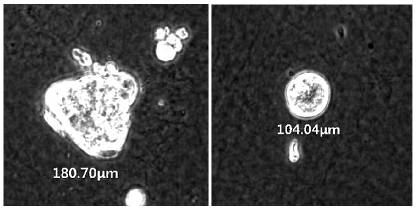Dr. Fukamachi from Japan stays in AMC, Korea: Part6
A3 Foresight Program: Collaborative Research on the Role of Epigenetic Pathway in Gastric Carcinogenesis
Report of a visit to AMC in Korea (Dec. 5 to Dec. 17, 2011)
HIROSHI FUKAMACHI (Department of Molecular Oncology, Tokyo Medical and Dental University)
Host researcher
Prof. Se Jin Jang (Department of Pathology, Asan Medical Center, University of Ulsan College of Medicine)
Summary
I visited again Prof. Se Jin Jang’s laboratory (Department of Pathology, Asan Medical Center, University of Ulsan College of Medicine, Seoul) in Korea to examine mice into which FACS-sorted cells were subcutaneously injected in my previous visits. I also cultured tumor cells obtained from newly-dissected gastric tumors in a serum-free condition to examine whether these cells formed spheres, which have been considered to be a characteristic of stem cells, and which were found in culture of human gastric tumor xenografts in experiments in TMDU. Preliminary results suggest that spheres were formed when cells from newly dissected gastric tumors were cultured in a serum-free condition. We hope that we can soon examine the mechanism of gastric tumorigenesis by using these sphere-forming cells in vitro. I deeply thank Prof. Se Jin Jang, Dr. Hyang Sook Seol and other members of AMC for giving me a chance to do experiment in a wonderful institute.
Contents
1. Background
As described in my previous report (“Dr. Fukamachi from Japan stays in AMC, Korea: Part 5”), we have been trying to identify gastric tumor-initiating cells in newly-dissected human gastric tumors. A purpose of my visit was to examine whether tumors were formed in mice into which FACS-sorted tumor cells were subcutaneously injected in our previous experiments. We recently found that some tumor-initiating cells formed spheres with strong tumorigenicity when cells obtained from human gastric tumor xenografts were cultured in a serum-free condition. Thus another purpose was to examine whether human gastric tumor cells obtained from newly-dissected tumors can be cultivated in a serum-free condition to form spheres in vitro, in collaboration with researchers in AMC including Professor Jang and Dr. Seol.
2. The experiment in AMC.
We found a successful 3 cases in which surface antigen-expressing cells formed tumors in mice into which FACS-sorted cells were injected in previous experiments while non-expressing cells did not. So far we have found four successful cases in previous experiments. Thus the total number of successful cases was increased to seven now. We think that we now get enough evidence suggesting that the antigen can be used for the identification of gastric tumor-initiating cells. During my stay in AMC, we got a total of 8 tumors, which were dissociated into single cells that were cultivated in a serum-free condition. Preliminary results indicate that some cells may form spheres in vitro as shown in phase contrast micrographs below. Experiments are now in progress to examine whether these cells retain strong tumorigenic activity or not.

3. Discussion at SNUH
During my stay in AMC, Seoul Pathology From was held at Seoul National University Hospital. I presented a paper “Identification and characterization of human gastric tumor-initiating cells” in the Forum, and discussed with the researchers on the subject. It was very good for me to have the chance to discuss with various pathologists in SNUH.
4. Acknowledgments
I deeply thank Professor Jang and members of his laboratory including Dr. Seol for their help and kindness during my stay in AMC.



